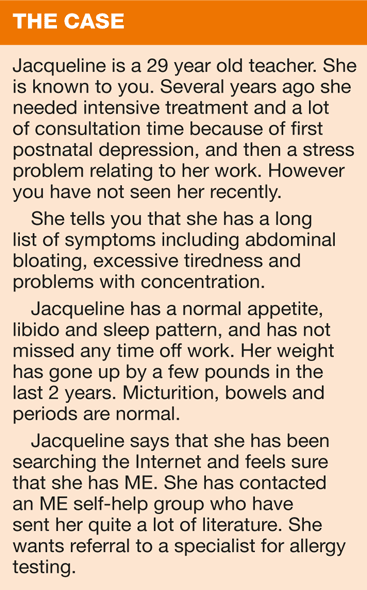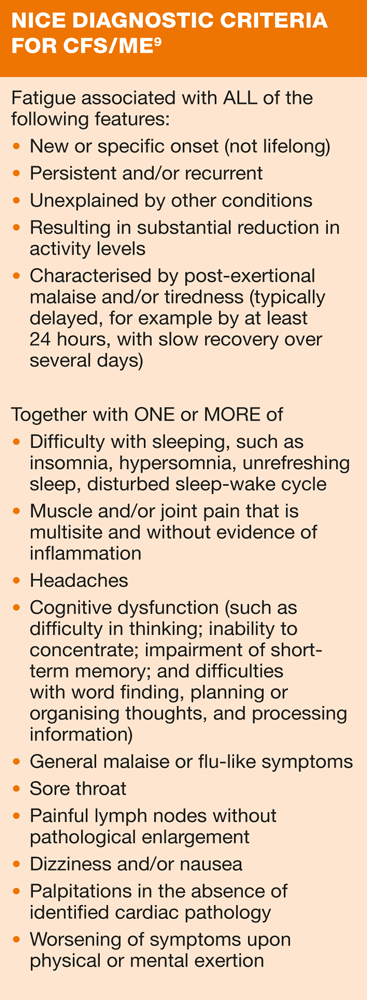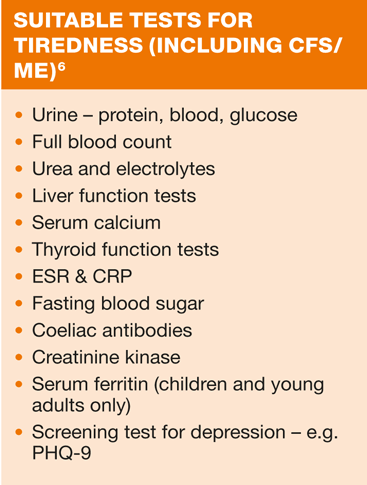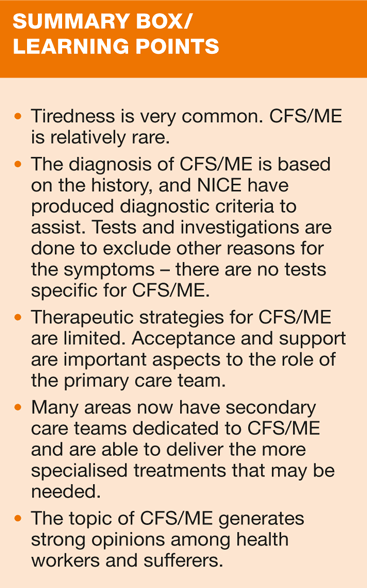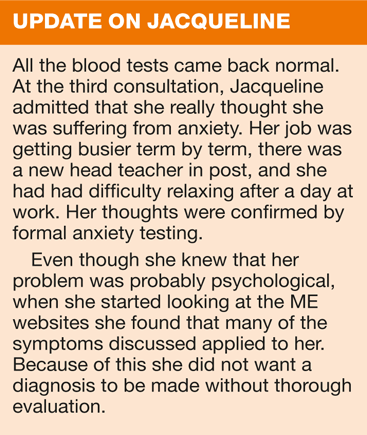Chronic Fatigue Syndrome
Dr Ed Warren
Dr Ed Warren
FRCGP
GP in Sheffield, Trainer, Barnsley VTS
Whether it is of psychological or physical origin or both, chronic fatigue syndrome can cause substantial morbidity and disability, and its management in primary care involves the whole team
It is most uncommon for patients to present in primary care because of too much energy or vitality. Tiredness, on the other hand, is a very common complaint. Tiredness is an ill-defined subjective symptom of malaise, aversion to activity and of impaired performance.1 It has physical and psychological dimensions. A distinction should be made between lack of energy, lack of motivation, and sleepiness - all of these can be described as 'tiredness', but will suggest different diagnoses.
STATISTICS OF TIREDNESS
- Up to a third of people at any one time say they have had tiredness for the last month or more.2
- Just over 10% of all people attending their GP complain primarily of tirednes.3
- Tiredness is, after respiratory problems, the commonest symptom complained of in primary care.4
- Patients will report only about one in 400 episodes of tiredness to their GP.5
- A GP with a list size of 2000 can expect 26 presentations a year for tiredness as the main symptom, and 150 more that have tiredness as well as other symptoms.4
The differential diagnosis of tiredness is huge. Indeed tiredness is probably a feature of all illness with the possible exception of mania. There is a spectrum of causes from the entirely physical at one end (around 9% of all presentations of tiredness)6 to the entirely psychological at the other. Around half of patients who present with tiredness think that their problem is psychological.7 Somewhere in the middle lies Chronic Fatigue Syndrome (CFS).
CFS is something of a hot potato, and polarises opinion markedly. There are no definitive tests for CFS. Indeed CFS probably has a mixture of different causes with one final common pathway of symptoms. The available evidence points to possible physical and psychological causes. However, there are individuals who are so convinced that CFS has a physical cause or causes that they object to research into possible psychological causes, sometimes so vehemently that the future of research into CFS is compromised.8 Even the names cause controversy: the scientific establishment favours 'CFS', whereas most self-help organisations refer to 'Myalgic Encephalomyelitis' (ME) even though there is no consistent evidence that inflammation anywhere, including the brain, is a feature of CFS. To a worker in primary care it will come as no surprise that CFS, like any other ailment, has physical and psychological features. Hereafter I will use the term 'CFS/ME'.
Definition of CFS/ME
In 2007, NICE produced guidance on the diagnosis and management of CFS/ME9 (see box). NICE says that CFS/ME affects 0.2% - 0.4% of the population, but admit that good epidemiological evidence is lacking.9 A community survey of adults in South East England found that 0.2% of respondents considered themselves to have CFS/ME, but 1% reported some of the diagnostic features.3 The ME Association says that 250,000 people in Britain have ME.10
Of patients seen in primary care who have had tiredness for more than 6 months, around a third will fit the diagnostic criteria for CFS/ME.7 CFS/ME is a major cause of illness and disability,1 but all patients with chronic tiredness have significant resulting disability.2
The diagnosis of CFS/ME is based primarily on the history, and the clinician being prepared to accept that the diagnosis is possible. A clinical examination, though recommended,11 is not usually helpful. The focus of the examination should be towards the most prominent features: for example, if there are palpitations then a check of the heart and blood pressure is appropriate. A few investigations designed to exclude other diagnoses can be of help, with the proviso that a diagnosis by exclusion is rarely satisfying to a patient, and the delay in getting the results back can cause anxiety. And, of course, if enough tests are done, eventually one will show an abnormality.12 The tests recommended as suitable are quite extensive. If your patient wasn't anaemic before she probably will be after.
As well as the investigations recommended, there are some features that may be associated with the tiredness which suggest serious illness6 - 'red flags':
RED FLAGS
- localising/focal neurological signs
- signs and symptoms of inflammatory arthritis or connective tissue disease
- signs and symptoms of cardiorespiratory disease
- significant weight loss
- sleep apnoea
- clinically significant lymphadenopathy.
In addition the NICE 'Referral guidelines for suspected cancer' (NICE clinical guideline 27)13 may be appropriate.
MANAGING CFS/ME
A team approach to CFS/ME is mandatory. It is the sort of condition where a practice nurse would do as well to involve GP colleagues at an early stage. The whole practice team may well become involved in ongoing management, and the route to diagnosis should not be the responsibility of just one worker. CFS/ME usually has long term implications for the primary care team as well as the patient.
Acceptance
Many patients with CFS/ME do not feel that their GP takes them seriously. Doctors quite commonly evade their patients' ideas, and this is twice as common with women as with men patients.5
Diagnosis
Disease processes within the differential diagnosis of CFS/ME are many and varied, and include some important ones. The use of proper diagnostic criteria should enable a positive diagnosis to be made. In patients who do not have CFS/ME, equal rigour must be employed in making and negotiating an alternative diagnosis.
Interventions
Individual patient symptoms can be managed according to the trouble they cause. If pain is prominent then analgesia may be appropriate. If sleep is an issue then the tricyclic antidepressant amitrityline is worth a try.9 In general start any medications at a small dose initially as drug intolerance is common. Don't prescribe for patients under 16. Nausea is best managed by small, dry meals.
Sleep problems can be managed with explanation and sleep hygiene advice.6 Discourage daytime naps.
Rest periods of up to 30 minutes, with reduced physical and mental intensity, can be timetabled into the daily routine. These might include relaxation techniques.
Diet should be in accordance with the government's 'The balance of good health' advice.14 Other specific diet strategies may help with gastrointestinal symptoms, but faddy and exclusion diets are to be resisted unless there is also dietician support - weird diets only work anecdotally and may lead to malnutrition. Sufferers from CFS/ME are nearly always intolerant of alcoholic drinks.15
The CFS/ME sufferer may need aids and adaptations.
The requirement of employers to support disabled workers is enshrined in law. However you may have to play 'patient advocate'. CFS/ME sufferers who stay in work are likely to do better and be less financially disadvantaged. Similar considerations apply to those in education.
Relapses in symptom severity are common:
- Try to identify any cause - unaccustomed activity, stress etc
- Mutually agree a course of action, reduced activity etc
- Deal with disappointment
- Managing triggers in future
REFERRAL
Referral is particularly useful if a diagnosis other than CFS/ME is being considered. Many patients will welcome the opportunity to ensure that no horrid diagnosis is being missed. Some of the more esoteric biochemical and serological associations with CFS/ME are in any case best assessed by a doctor who is more familiar with them than the average GP. Many areas have a team dedicated to the treatment of CFS/ME. Graded exercise programmes and specialist Cognitive Behavioural Therapy in CFS/ME are best delivered in a specialist setting.6
A referral is appropriate when a positive diagnosis of CFS/ME has been made, or when the search for an alternative diagnosis has been abandoned. Referral is also a good idea if specialised interventions not available in the community are being considered. In any event NICE suggests referral to a CFS/ME specialist:11
- Severe CFS/ME - immediate referral. The 'severity' of CFS/ME is not defined, but is would be reasonable to assess this by the amount of disability being caused. On one hand, Jacqueline is soldiering on with her work and the symptoms are an inconvenience rather than a total barrier. On the other hand, people bedridden with CFS/ME deserve early assessment.
- Under 16 - refer to a paediatrician within 6 weeks of presentation. There is a peak in the childhood incidence of CFS/ME at about 13 years. Tiredness may not be the prominent feature at this age. Early referral is probably wise.
- Mild CFS/ME - within 6 months of presentation.
- Moderate CFS/ME - within 4 months of presentation.
- Patient choice
Take-home message
CFS/ME is just like any other symptom constellation presenting to primary care. It has physical and psychological dimensions. It deserves proper investigation and evaluation. o
REFERENCES
1. Sharpe M and Wilks D. ABC of psychological medicine. Tiredness BMJ 2002;325:480-3.
2. Ridsdale L. Tired all the time. BMJ 1991;303:1490-1.
3. Pawlikowska T, Chalder T, Hirsch S R et al. Population based study of tiredness and psychological distress. BMJ 1994;308:763-6.
4. Ridsdale L, Evans A, Jerrett W et al. Patients with tiredness in general practice: a prospective study. BMJ 1993;307:103-6.
5. Ridsdale L, Evans A, Jerrett W et al. Patients who consult with tiredness: frequency of consultation, perceived causes of tiredness and its association with psychological distress. Br J Gen Pract 1994;44:413-416.
6. Simon C. Tiredness, tiredness and lethargy. InnovAit 2008:1(3);199-205
7. Darbishire L, Ridsdale L and Seed P T. Distinguishing patients with chronic tiredness from those with chronic tiredness syndrome: a diagnostic study in UK primary care. Br J Gen Pract 2003;53:441-5.
8. Hawkes N. The dangers of research into CFS/ME. BMJ 2011;342:1392-5.
9. Baker R & Shaw EJ. Diagnosis and management of chronic tiredness syndrome/myalgic encephalomyelitis (or encephalopathy): summary of NICE guidance. BMJ 2007;335:446-8
10. ME Association. http://www.meassociation.org.uk/index.php?option=com_content&view=category&layout=blog&id=38&Itemid=173 [31 May 2010]
11. Chronic tiredness syndrome/myalgic encephalomyelitis (or encephalopathy). NICE clinical guideline 53. August 2007 http://www.nice.org.uk/nicemedia/live/11824/36190/36190.pdf [21February 2012]
12. Anon. Editor's choice: Are you normal? BMJ 1997;314:0.1
13. NICE. Referral guidelines for suspected cancer (CG27) April 2011. http://www.nice.org.uk/nicemedia/live/10968/29813/29813.pdf [21 February 2012]
14. Food Standards Agency. The Balance of Good Health www.food.gov.uk/multimedia/pdfs/bghbooklet.pdf [21 February 2012]
15. M.E. - Information for doctors. Wells: M.E.Action Campaign,1991.
Related articles
View all Articles
